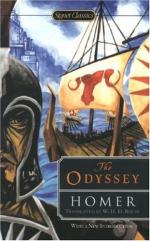“Eurymachus,” answered Ulysses, “if you and I were to work one against the other in early summer when the days are at their longest—give me a good scythe, and take another yourself, and let us see which will last the longer or mow the stronger, from dawn till dark when the mowing grass is about. Or if you will plough against me, let us each take a yoke of tawny oxen, well-mated and of great strength and endurance: turn me into a four acre field, and see whether you or I can drive the straighter furrow. If, again, war were to break out this day, give me a shield, a couple of spears and a helmet fitting well upon my temples—you would find me foremost in the fray, and would cease your gibes about my belly. You are insolent and cruel, and think yourself a great man because you live in a little world, and that a bad one. If Ulysses comes to his own again, the doors of his house are wide, but you will find them narrow when you try to fly through them.”
Eurymachus was furious at all this. He scowled at him and cried, “You wretch, I will soon pay you out for daring to say such things to me, and in public too. Has the wine been getting into your head or do you always babble in this way? You seem to have lost your wits because you beat the tramp Irus.” With this he caught hold of a footstool, but Ulysses sought protection at the knees of Amphinomus of Dulichium, for he was afraid. The stool hit the cupbearer on his right hand and knocked him down: the man fell with a cry flat on his back, and his wine-jug fell ringing to the ground. The suitors in the covered cloister were now in an uproar, and one would turn towards his neighbour, saying, “I wish the stranger had gone somewhere else, bad luck to him, for all the trouble he gives us. We cannot permit such disturbance about a beggar; if such ill counsels are to prevail we shall have no more pleasure at our banquet.”
On this Telemachus came forward and said, “Sirs, are you mad? Can you not carry your meat and your liquor decently? Some evil spirit has possessed you. I do not wish to drive any of you away, but you have had your suppers, and the sooner you all go home to bed the better.”
The suitors bit their lips and marvelled at the boldness of his speech; but Amphinomus the son of Nisus, who was son to Aretias, said, “Do not let us take offence; it is reasonable, so let us make no answer. Neither let us do violence to the stranger nor to any of Ulysses’ servants. Let the cupbearer go round with the drink-offerings, that we may make them and go home to our rest. As for the stranger, let us leave Telemachus to deal with him, for it is to his house that he has come.”
Thus did he speak, and his saying pleased them well, so Mulius of Dulichium, servant to Amphinomus, mixed them a bowl of wine and water and handed it round to each of them man by man, whereon they made their drink-offerings to the blessed gods: Then, when they had made their drink-offerings and had drunk each one as he was minded, they took their several ways each of them to his own abode.




